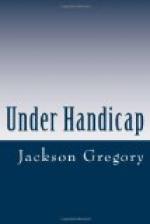“The girl’s father run a cattle-range out there?”
“Uh-uh. The Half Moon an’ three or four smaller ranges. He’s old man Crawford—p’r’aps you’ve heard on him?”
Conniston shook his head, suppressing a smile.
“I don’t think I have. Far out to his place?”
“Oh, it ain’t bad. Let’s see. It’s fifty mile to the hills, an’ he’s about forty mile fu’ther on.” He stopped for a brief mental calculation. “That makes it about ninety mile, huh?”
“How does a man get out there? A narrow-gauge running from somewhere along the main line?”
“Darn narrow, stranger. You can walk if you’re strong for that kind of exercise. Mos’ folks rides. Goin’ out?”
“It’s rather a long walk,” Conniston evaded. And shortly afterward, hearing a clanging bell up the street in the direction of the hotel, he strolled away to his dinner.
He found Hapgood scowling into his high-ball glass and dragged him away to the little dining-room. Both the tables were set. At one of them the cowboy whom he had seen at the store was already eating with two of his companions. Conniston and Hapgood were shown to the other table by the stout Mary. Hapgood cast one glance at the stew and coarse-looking bread put before him, and pushed his plate away. Conniston, who had had fewer high-balls and more fresh air, actually enjoyed his meal. The men at the other table glanced across at them once and seemed to take no further interest.
Hapgood waited, bored and conventional, until Conniston had finished, and then the two went back into the bar-room. The sun had gone down, leaving in the west flaring banners of brilliant, changing colors. The heat of the day had gone with the setting of the sun, a little lost, wandering breeze springing up and telling of the fresh coolness of the coming night. And it was still day, a day softened into a gray twilight which hung like a misty veil over the desert.
From the card-room came the voices of the proprietor and the men with whom he was still playing. They had not stopped for their supper, would not think of eating for hours to come.
“If you feel like excitement—” began Conniston, jerking his head in the direction of the card-room.
Hapgood interrupted shortly. “No, thanks. I’ve got a magazine in my suit-case. I suppose I’ll sit up reading it until morning, for I certainly am not going to crawl into that cursed bed! And in the morning—”
“Well? In the morning?”
“Thank God there’s a train due then!”
Conniston left him and went out into the twilight. He passed by the store, by the saloon, along the short, dusty street, and out into the dry fields beyond. He followed the road for perhaps a half-mile and then turned away to a little mound of earth rising gently from the flatness about it. And there he threw himself upon the ground and let his eyes wander to the south and the faint, dark line which showed him where the hills were being drawn into the embrace of the night shadows.




